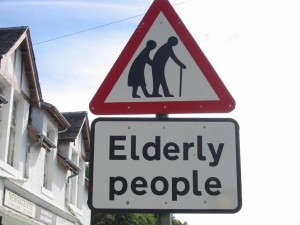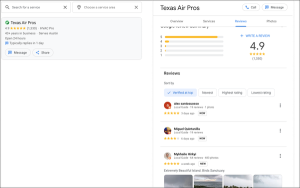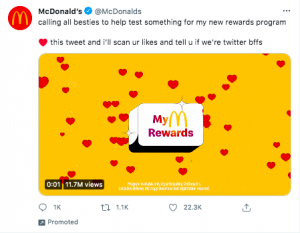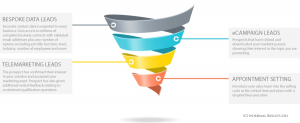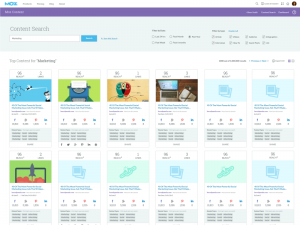Capitalizing on sporting events can be a great opportunity for advertisers, but will this strategy work for everyone? Columnist Laura Collins looks at the results of some recent campaigns to find out.

For any of you out there who aren’t sports fans, this probably isn’t shaping up to be the best summer of your life. Between Euro 2016, Wimbledon and the Olympics, we’ve been bombarded with reminders that our weekly half-hour at the gym probably isn’t cutting it.
But, whether you love them or hate them, there’s no denying that events like these bring people together on an international scale that can scarcely be rivaled.
You only have to take a look at Google trends and the enormous surge in traffic around sporting events to see what a huge opportunity this is to connect with people:
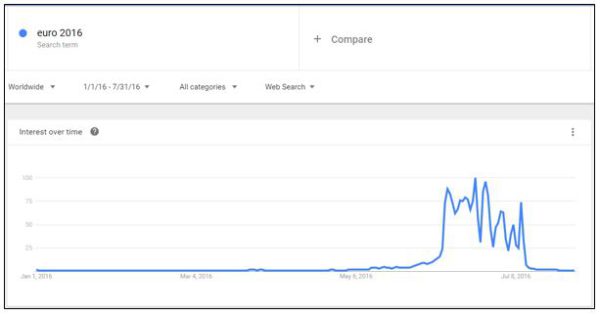
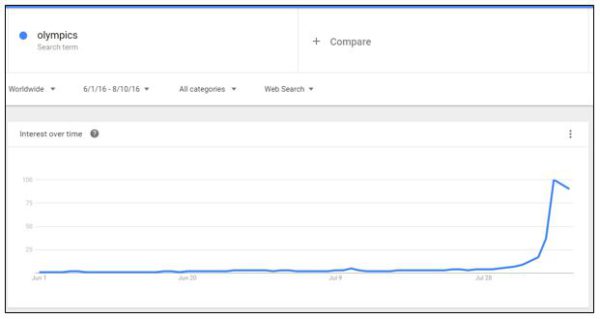
For any of you out there who aren’t sports fans, this probably isn’t shaping up to be the best summer of your life. Between Euro 2016, Wimbledon and the Olympics, we’ve been bombarded with reminders that our weekly half-hour at the gym probably isn’t cutting it.
But, whether you love them or hate them, there’s no denying that events like these bring people together on an international scale that can scarcely be rivaled.
You only have to take a look at Google trends and the enormous surge in traffic around sporting events to see what a huge opportunity this is to connect with people:

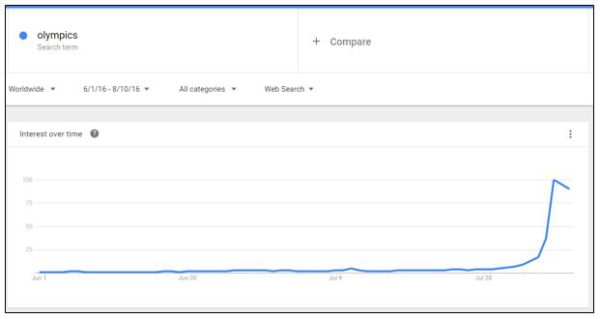
I can think of few advertisers that wouldn’t love to take advantage of huge spikes in public interest like this, but is it appropriate for everyone? Where’s the line between effectively tapping into that public interest to better performance and just jumping on the bandwagon for the sake of it?
A handful of Merkle|Periscopix clients chose to run activity specifically related to sporting events this summer. Here, we take a look at what strategies they implemented and whether they achieved success.
The online bookmakers
Few advertisers seem more appropriate for running ads related to sporting events than online bookmakers. Football fans across the UK were gambling themselves into a frenzy for the entire duration of the month-long Euro 2016 championship (despite enthusiasm declining slightly after England’s swift exit), and we implemented a comprehensive strategy for one of our clients, including:
- expanding our competitor bidding and bidding more aggressively on competitor terms (a common practice in the gambling industry) for the duration of the tournament;
- increasing bids on generic and competitor terms before, after and during key matches; and
- updating ad copy on a daily basis to reflect the latest fixtures and odds.
It’s not surprising to see that traffic and costs increased in the lead-up to key matches:

But what’s great to see is that first-time deposits (their most important KPI) also increased around those games. Even better, we could see that the proportion of conversions coming from non-brand terms was significantly higher during those games. This showed that our increased investment in generics and competitors had paid off.
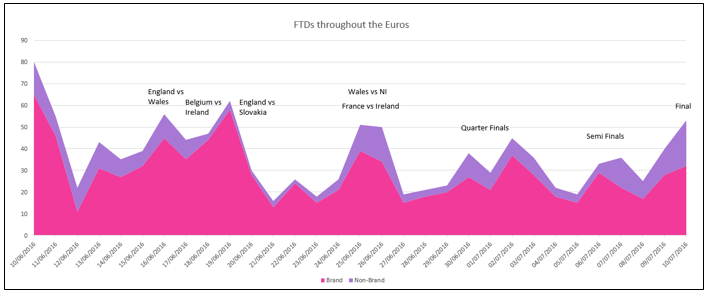
With a client so intrinsically linked to sports, implementing specific strategies like this was a huge success and certainly something we would do again.
The supermarket
A well-known British supermarket had produced some tongue-in-cheek video content which they wanted to use to promote their online delivery service to users who may be having friends over to watch a game. The message was to avoid running to the shops at the last minute by ordering online beforehand with ease.
The obvious choice for making the most of this video asset was TrueView. We chose a variety of targeting options including:
- Euro 2016 video placements;
- the “Soccer Fans” affinity group; and
- football anthem video placements.
This campaign was designed strictly for brand awareness and as such, was targeted with achieving over one million impressions and a view rate of above 20 percent. In fact, it beat its impression target by 28 percent and achieved a view rate of 22 percent, so it was a success in that respect.
The football anthems placements performed particularly well, with a view rate of over 40 percent! It seems the tongue-in-cheek nature of the video ad resonated much better with audiences that enjoyed novelty football songs than those looking for serious football content.
It’s worth noting that while this worked well as a brand awareness strategy, it achieved only a handful of conversions despite spending almost £9,000. Conversions weren’t a KPI in this case, so this didn’t pose a problem, but it’s not too surprising to see that when the product or service being promoted isn’t as closely related to football, direct response is much lower.
The obscure ones
A few clients decided to get a piece of the action despite their products’ relevance to sporting events being, in some cases, tenuous at best. The thinking behind this was that with all that buzz and traffic out there, surely it makes sense to try and tap into it however we can.
One telecommunications company specializing in SMS marketing wanted to target bars and pubs showing Euro 2016 matches. The aim was to get them to sign up for the SMS marketing service so they could alert their customers to particular matches or offers that were on at any time.
In order to do this, we utilized domain targeting with Gmail ads. We targeted the domains of known drinks suppliers, from whom their target audience were likely to have received emails. Unfortunately, we came across two problems with this strategy:
- The audience proved too niche and the targeting too narrow. The whole campaign generated a very small number of impressions and clicks.
- What little response it achieved was very expensive. The CPA for this campaign was 360 percent higher than that of other prospecting activity run via Gmail during the same period.
Another client, a luxury goods retailer, secured a deal to sell official team GB merchandise, including bracelets and cufflinks. Again, with a product that wouldn’t already be well-known to users, search was out of the question, and it was decided to promote these items via Gmail ads. There was a host of sporty targeting options at our disposal, such as:
- team GB/Olympics keywords;
- topics like Olympics, Swimming, Sports News; and
- interests like running, health & fitness and tennis.
Despite the seemingly perfect marriage of official Team GB merchandise and sports-loving audiences, in the three weeks prior to the Olympics, the campaign spent almost £700 but failed to secure a single conversion.
On reflection, vast numbers of people could fall into the audiences being targeted here, but a love of sport was no strong indication that they’d be interested in buying such a niche product.
Conclusions
People are incredibly passionate about sports. Whether they’re watching live, cheering along to the TV with their friends or posting about it on social media, few things will get that kind of reaction from so many people.
And while that passion can translate into engagement and sales for products and brands with a clear affinity to these sporting events, it’s obvious from our experiences that it doesn’t work for everyone. Passionate fans can smell insincerity a mile off, so don’t try to shoehorn a sports-related message into your offering thinking you can magically get anyone watching an event to buy into your brand.
If your products or services can truly enrich a user’s experience of these kinds of sporting events, then, by all means, get involved with that buzz. But otherwise — as I think to myself when watching the 100m finals from the sofa — leave it to the professionals.
[Article on Search Engine Land.]
Some opinions expressed in this article may be those of a guest author and not necessarily Marketing Land. Staff authors are listed here.
Marketing Land – Internet Marketing News, Strategies & Tips
(43)
Report Post
